National group retracts claim Lola Olufemi blocked free speech by refusing to meet pro-life activists
The Alliance of Pro-Life Students rescinded an accusation that CUSU’s women’s officer had suppressed free speech by refusing to meet Cambridge Students for Life

A national group for pro-life students has retracted accusations that CUSU women’s officer Lola Olufemi contributed to the “oppression” of pro-life students’ free speech by refusing to meet a group of Cambridge activists.
The Alliance of Pro-Life Students (APS) made the comments as part of a government inquiry into censorship on university campuses, citing Olufemi’s actions as part of a pattern of “intolerance to the right of pro-life students to their freedom of speech”.
APS, a UK-wide group which supports students in establishing and running university pro-life societies, based its claim on information from Cambridge Students for Life (CSFL), a University of Cambridge society. CSFL have disowned the comments, saying on Thursday that the information was provided “without Cambridge Students for Life’s awareness and it is not our own wording”.
In a section of their evidence pertaining to the University of Cambridge, APS said “Since September 2017 the women’s officer, despite it being her occupation to advocate for female students on campus, will not meet with the female leader of Cambridge Students for Life, for any reason at all, simply because ‘Any association between us would compromise my own moral values.’”
The quote about Cambridge has ostensibly been removed from APS’s evidence, but as of Friday evening can still be read due to a failure to properly redact the document, which is hosted on parliament’s national website.
The statement failed to note that Olufemi’s pro-choice position is mandated by the constitution of CUSU’s Women’s Campaign (WomCam), which holds that stance through its affiliation with the National Union of Students’ campaign for women – something which she had previously explained to CSFL.
Olufemi said the incident showed “where conversations about free speech begin to lose all meaning”.
Got a story for us?
Seen something you think Varsity should be talking about? Contact our News team at news@varsity.co.uk.
“To claim that in my position as women’s officer, I have the power to suppress an organisation’s speech by adhering to the political position that I am mandated to hold is bizarre, to say to the least,” she said. “As a feminist who believes and fights for reproductive justice, I refuse to let anti-choice organisations peddle false accusations in order to further a narrative that “pro-life” students are targets on campus.”
Olufemi acknowledged the quote attributed to her, but said they had failed to include the context of her mandate.
In a reply to CSFL after they requested a meeting, she told the group: “The women’s campaign is not merely a representative body, it is a political one. It is mandated by its members to hold core values and beliefs. As such, it does not matter that there are women and non-binary students who oppose abortion because the women’s campaign has been mandated to protect and advance access to abortion. Associating with anti-choice groups does neither of these things.”
It is the second time in recent months that Olufemi has had her position misrepresented in a national debate: last month, The Daily Telegraph explicitly apologised to her for falsely claiming she sought to remove white authors from the curriculum.
The government’s review into free speech has received response for a variety of stakeholders, including student groups at universities. In evidence published yesterday, Cambridge defended ‘safe spaces’ but sounded caution over the legality of no-platforming.
In its submitted evidence, APS said there was increasing “suppression” of pro-life groups by students’ unions, which they claimed was often conducted “under the guise of providing a ‘safe space’ for students.” They cited examples for several universities, including Oxford, KCL, Glasgow, and Cambridge.
APS told Varsity on Friday that “Due to the incident not being formally approved by the students for inclusion in our evidence, we have asked the committee to remove it”. They declined to comment on why they believed the incident to be an example of freedom of speech being suppressed.
Olufemi told Varsity: “Freedom of speech is not at stake here, the Alliance for Pro-Life Students have not been stopped from disseminating information, holding events, organising on campus, writing for student press. If anything, this shows their very poor understanding of what freedom of speech actually means. The women’s campaign does not have the power to suppress their speech – we do have an obligation to fight for and protect student’s rights to access safe, free and legal abortion and to challenge the stigma those seeking terminations face.”
Though they disowned APS’s comment, Cambridge Students for Life defended their attempts to set up a meeting with Olufemi. They said “we both represent Cambridge Students with different opinions about abortion, but we believe that both opinions matter. There is currently very little dialogue between the diverse positions many Cambridge students hold about this issue and we thought there could be a great benefit to listening to one-another’s views and engaging with different stances.”
They said that CSFL and WomCam had a shared interest in “seeking to support, listen to and empower women”, adding that for the pro-life group that meant “seeking to support charities which provide for vulnerable pregnant women, educating students on the medical aspects of unborn and neonatal life and supporting student parents”.
CSFL acknowledged Olufemi’s mandate, but said they wished to see CUSU engage more with pro-life activists.
“In defence of Lola [Olufemi], as Women’s Officer and part of NUS she has a mandate to have a particular stance on abortion and this makes dialogue difficult when the topic becomes non-negotiable and political. As Cambridge Student for Life, we would love to see space being made within the students’ union to include the huge diversity of opinions on abortion within the University.”
Olufemi said the incident had not provoked any animosity between WomCam and CSFL, which have clashed in the past.
She told Varsity: “Safeguarding the right to free, safe and legal abortion and tackling the stigma around termination for all those who access it is a feminist task and not yet our reality. I stand in solidarity with campaigners in Ireland who are attempting to do just that.”
 Comment / Cambridge students are too opinionated 21 April 2025
Comment / Cambridge students are too opinionated 21 April 2025 Comment / Does the AI revolution render coursework obsolete?23 April 2025
Comment / Does the AI revolution render coursework obsolete?23 April 2025 Comment / Cambridge’s tourism risks commodifying students18 April 2025
Comment / Cambridge’s tourism risks commodifying students18 April 2025 News / News in brief: campaigning and drinking20 April 2025
News / News in brief: campaigning and drinking20 April 2025 Interviews / Meet the Chaplain who’s working to make Cambridge a university of sanctuary for refugees20 April 2025
Interviews / Meet the Chaplain who’s working to make Cambridge a university of sanctuary for refugees20 April 2025








